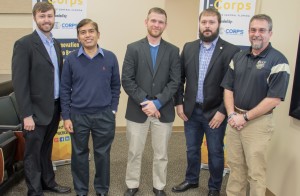Feynman Nano
Clear Solutions – Maximizing Environmental Benefits
One of the biggest impediments to a wider adoption of solar energy is cleanliness – or a lack of it. Most solar energy farms are located in deserts, where spaces are wide open, dusty and the sun is strong. These factors are important to take into consideration when building a solar energy farm, which consists of hundreds or thousands of solar panels.
Dr. Jayan Thomas, UCF researcher at the Nano- Energy-Photonics Group, has made international headlines with his work in sustainable, renewable energy technologies. Now, he is working on another effort Feynman Nano – developing technology solutions to address solar park cleaning that he hopes to bring to market by tapping support from UCF’s I-Corps program.
To address the challenges of solar park cleaning, Feynman Nano has fabricated an “Always Clean” film to apply to solar panels, using hydrophobic/oleophobic properties to prevent the panels from getting dirty.
The team consists of Thomas, as principal investigator, and co-founder;
Brandon Carpenter, inventor of the technology, serial entrepreneur, and entrepreneurship fellow at the Blackstone Launchpad and co-founder.
Jonathan Wachob, serial entrepreneur, and Senior Fellow at the Blackstone Launchpad. Wachob is widely known as an industry expert frequently consulting with renewable energy startups.
“We are currently applying for NSF/DOE SBIR and STTRs. Our goal with the I-Corps Site program is to develop a strong mentorship relationship and understand more about what the NSF is hoping to fund at later times,” says Carpenter.
Solar park cleaning has two major technologies, specialized robots and manual labor. Manual labor is cost-competitive in markets with cheap labor such as China and India, however the costs are much higher in the United States to be
competitive, especially with servicing large parks. Specialized robots such as those manufactured by Ecoppia are designed for cleaning large solar parks, however a human touch is still required.
“Our intention is to conduct further customer discovery around market costs and how we can translate that into an acceptable price point,” says Thomas.
Currently, there are no competitors fabricating nanostructure self-cleaning films. Other methods for fabricating nanostructures (such as UV lithography) are too expensive to be market-competitive. It is anticipated that competitors will enter the market in the future, utilizing new and innovative fabrication techniques.






